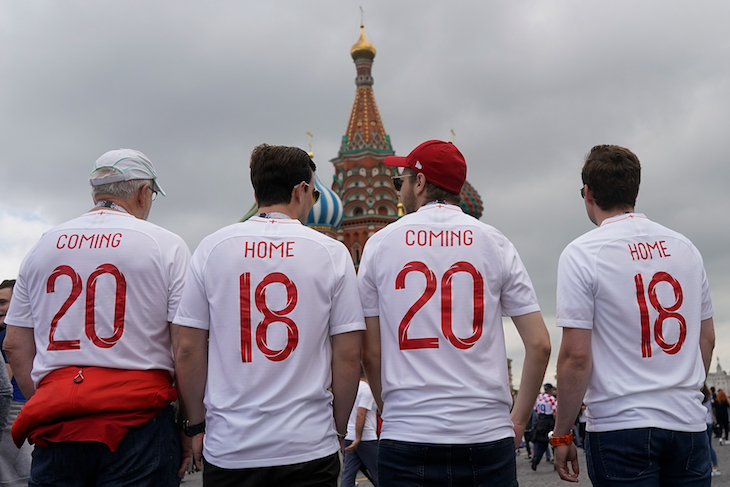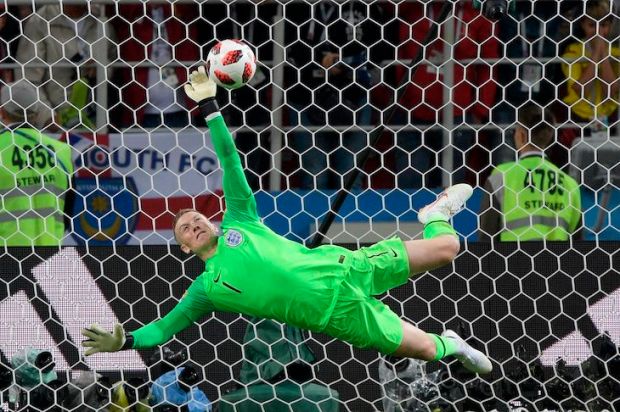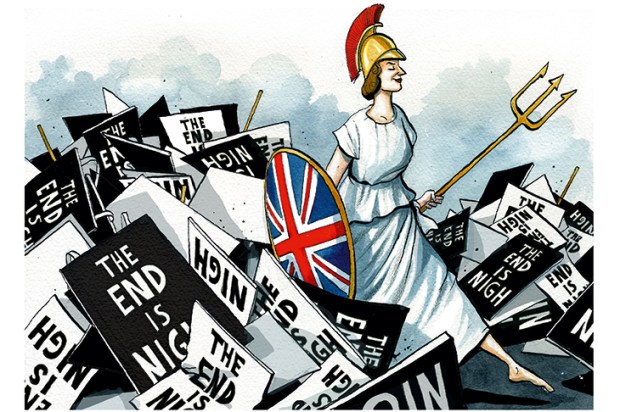Buying fish at Cambridge market on Sunday, I found myself chatting to the fishmonger about the prospects for England in the World Cup. Another customer, a middle-class woman, joined in. None of us, I think, was a habitual fan. But we found ourselves enjoying a few minutes of spontaneous shared pleasure. It was not mere satisfaction in winning, but shared pride in a team of nice young men, seemingly unassuming, modest, sporting, decent. English, we might have said (though we didn’t). But English as we would like to think it should be — perhaps the Englishness of another time. A once and future Englishness, let us hope.
It’s not every day that one has this un-sought sense of shared ‘identity’. For once that overworked word seems right: a feeling of belonging and wanting to belong to an imagined community stretching far beyond everyday experience. It’s not quite patriotism (for it has nothing really to do with the good of the nation) and certainly not nationalism (it has no political element). It’s a normal kind of feeling that one would no doubt encounter at market stalls in Croatia, Belgium and France. But in England it has often seemed illicit, rather shameful. The Cross of St George is often disdained as the badge of white-van men and other deplorables, as Emily Lady Nugee memorably reminded us. In Cambridge, one is likely to see more EU flags flying than those of England.
Yet ideas of Englishness run deep: they are among the oldest forms of national identity. The Venerable Bede wrote an influential history of the English people in the 8th century, before there was even an English kingdom. In the oldest surviving private letter in English, written some years before the Norman Conquest, ‘brother Edward’ is reproached for copying the Danish hair-style, short at the back and with a fringe over the eyes, a sign that ‘you despise your cynn’. Foreigners commonly believed we had tails. Before national institutions developed, there were place, language and some sense of common belonging.
The Norman Conquest might have obliterated these. The new French-speaking rulers came to think of themselves as ‘Engleis’, but only as the Dutch in South Africa later thought of themselves as Afrikaans. The Church kept grass-roots Englishness going, however, and the Hundred Years’ War with France eventually stimulated a rebirth of language, literature and sentiment. Anger at the failure of royal government to counter French depredations led directly or indirectly to two mass revolts and what were later called the Wars of the Roses. The Reformation, once it adopted an English Bible and Prayer Book, consolidated a homogenous national culture. In contrast, France, praying in Latin, remained a polyglot country until well into the 19th century: in many regions, officials needed interpreters, like colonial administrators.
But something strange had meanwhile happened to Englishness. During the 18th and 19th centuries it got absorbed into Britishness and into the empire. This was not a straightforward process. Many people, including those from other parts of Britain and its colonies, often used the word ‘England’ to mean the new United Kingdom. ‘England’ retained a greater emotional power and a sense of something real: ‘England expects’, signalled Nelson to his rather diverse crews.
The English eventually realised that others found this practice rather rude, and so started using ‘British’ for everything, including themselves: so we had not only British politics and British institutions, but also British culture, British values, British traditions — even for things much older than the Act of Union of 1707. It was politically tactful to downplay Englishness. Even the national curriculum for history in English schools de-emphasises England, defining itself as being about ‘Britain’s past and that of the wider world’.
Given our history, which has in some ways been rather embarrassingly successful (is this an English way of putting it?), we cannot expect to be universally loved. At the time we were liberating the Continent from Napoleon (as we saw it), a member of the government, George Canning, admitted that ‘we must not hide the fact from ourselves that we are hated throughout Europe’. We have played the role of villain in many countries’ national sagas: even friendly countries close to us in values and culture often trace their national history back to divorce from England. Those of us who are particularly susceptible to other countries’ sentiments may pick up a sense that being English is something to be apologised for. The history of the empire — especially the way its history has been interpreted since the 1960s — has for many left a stain on the idea of England, associating it with slavery, exploitation and violence. Ironically, the end of empire, rather than being felt as release from a heavy and compromising burden (‘a millstone round our necks’, in Disraeli’s phrase) was seen even by anti-imperialists as proof of weakness, decadence and ‘decline’ — another reason to be apologetic.
There may be another element too in our ambivalence about Englishness. There is a long history, going back certainly to the 17th century, of groups of English people who felt excluded, or who excluded themselves, from the mainstream. The most obvious were religious minorities — especially the ‘Puritans’ and their inheritors — who saw much of English culture and history as sinful, corrupt, drunken, vulgar and oppressive. The Puritans abolished horse-racing and Christmas, and would no doubt have disapproved vehemently of red crosses flown from white stagecoaches. Later generations of high-minded dissenters backed the American and French Revolutions and later still Soviet Communism. They condemned the British empire and fervently supported the League of Nations, appeasement and eventually European federalism. England’s history, institutions and culture were not, some felt, really theirs: not their creation, not a system they trusted or wanted to be identified with. As George Orwell memorably put it, they would rather be caught stealing from a poor box than standing up for the national anthem.
Englishness survived, and even flourished in the late 19th century, but it became focused on certain contexts and certain moods: poetry, music, folk culture, the countryside. It developed an elegiac and defensive reflex: the ‘Preservation of Rural England’ encapsulates the sentiment. Think of ‘A Shropshire Lad’, ‘Adelstrop’ and ‘The Lark Ascending’. So the idea and feeling of Englishness developed in a lopsided way. Do we naturally talk about ‘the dynamism of new English technologies’? Of London as ‘the world centre of modern English culture’? Of Cambridge as ‘England’s leading university’? I don’t think we do.
We might at first sight approve of this: we don’t want to encourage a blustering John-Bullishness. But overdoing the negatives, or merely the silences, has a downside. Disapproved of or ignored by much of the progressive elite, Englishness was left to the un-progressive, the football hooligans, the white-van men. Shorn of its culture and history, it was narrowed down to a symbol of defiant pride among people who were left few things to be proud of. Football (not only in England, of course) gave some a toxic sense of empowerment through numbers and violence.
England’s World Cup team seem to have left this subculture far behind. Their ethnic diversity seems so natural as not to be even worth mentioning. They represent an England that we like, modern and yet conscious of tradition and belonging. This is a lot to expect from a few professional sportsmen. Yet football in England can already claim to have discredited a once common popular racism. Can it also help us feel legitimately happier about our English identity?
Brexit is the ghost at the feast. Sport has always been an opiate of the masses, and if Harry Kane carries off the World Cup trophy will it help Theresa May to pull off a Brexit sleight of hand? Perhaps for a while. But Brexit is linked with English identity and with a sense of national self-confidence. This is not because the English are uniquely Eurosceptic. The EU is unpopular across Europe, with a few exceptions such as in Scotland. The difference is that most English voters felt in 2016 that they had the right and the power to choose their country’s future: some two thirds of parliamentary constituencies voted to leave. They refused to be intimidated. They no longer felt ‘the sick man of Europe’. They believed that they should be ruled through their own institutions, with their own express consent. This is perhaps the most continuous of English traditions, the very core of what Englishness has been felt to mean over many centuries.
What will happen to this sense of English self-confidence if the majority finds itself cheated by its own political class? Our sense of national solidarity and of democratic legitimacy, already sorely tested, will be seriously undermined. We will face years, perhaps decades, of bitter dispute and recrimination. Winning the World Cup would be a hollow victory compared with such abject humiliation.
Got something to add? Join the discussion and comment below.
Get 10 issues for just $10
Subscribe to The Spectator Australia today for the next 10 magazine issues, plus full online access, for just $10.
You might disagree with half of it, but you’ll enjoy reading all of it. Try your first month for free, then just $2 a week for the remainder of your first year.














Comments
Don't miss out
Join the conversation with other Spectator Australia readers. Subscribe to leave a comment.
SUBSCRIBEAlready a subscriber? Log in